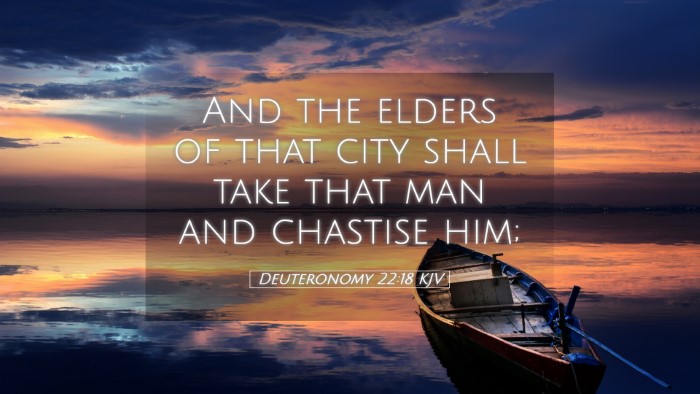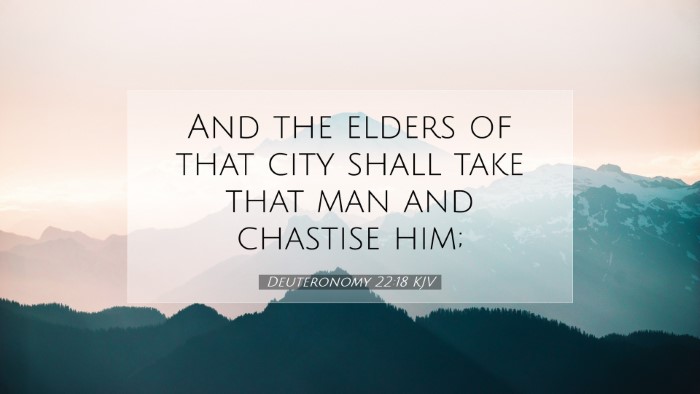Commentary on Deuteronomy 22:18
Verse Text: "And the elders of that city shall take that man and chastise him."
Introduction to Deuteronomy 22:18
This verse is part of a broader section in Deuteronomy that addresses various laws and regulations pertaining to moral conduct, marital fidelity, and communal responsibilities. Deuteronomy, often seen as a reinforced covenant code, lays a significant foundation for Israelite law, emphasizing both divine directive and social ethics.
Contextual Background
Deuteronomy 22 deals with the proper conduct among members of the Israelite community, specifically regarding sexual morality and the integrity of personal reputations. This chapter emphasizes justice and the role of community leaders, reinforcing that societal norms must be upheld. The mention of "elders" indicates a system of governance where authority figures within the community are called to administer justice.
Exegesis of Key Terms
- Elders: The term "elders" refers to appointed leaders within the tribes of Israel, responsible for making judicial decisions and upholding the covenant regulations (cf. Exodus 18:21-22).
- Chastise: This term can imply correction or punishment, suggesting that the action might not solely be punitive but also aimed at restoration and moral rectitude.
Insights from Commentators
Matthew Henry
Matthew Henry emphasizes the community's role in maintaining moral standards. He notes that the action of chastisement serves as a deterrent to prevent further wrongdoing. Henry points out that such measures not only aim to correct the offender but also protect the sanctity of marriage and community integrity.
Albert Barnes
Albert Barnes offers a historical context, linking this verse with ancient Near Eastern customs about handling breaches of sexual morality. He highlights the seriousness of the accusation and the necessity for due process before judgment. Barnes comments that this judicial involvement underscores a commitment to fairness and the communal nature of justice, allowing for a thorough examination of the case before any action is taken.
Adam Clarke
Adam Clarke interprets the verse with an eye on the underlying principles of justice and social order. He suggests that the response to such accusations must be tempered with wisdom and discernment, reflecting the character of God as just and righteous. Clarke further notes that this law reveals God’s concern for purity in relationships, demonstrating that all actions have communal implications.
Theological Implications
The mandate for chastisement by the elders raises several theological points pertinent for pastors, students, theologians, and Bible scholars:
- Justice and Mercy: The balance of justice (through community intervention) and mercy (the aim of repentance and restoration) must be considered when interpreting this verse.
- Community Responsibility: Believers are reminded of their role within the church and society to uphold moral standards and act when they witness wrongdoing, thus fostering accountability.
- Understanding Sexual Ethics: Sexual fidelity is portrayed as vital to community health, reflecting God's intent for relational purity, which has implications both in ancient and modern contexts.
Practical Applications
This verse invites contemporary application in several areas:
- Counseling Relationships: Pastors can draw from this text when addressing issues of infidelity or moral failure within their congregations, emphasizing the need for restoration in the context of community.
- Teaching on Authority: Leaders within the church may reflect on the responsibilities of church governance, stressing that their authority should be exercised with righteousness and integrity.
- Promoting Community Integrity: Churches should engage in discussions about personal conduct, mutual accountability, and the consequences of moral failings, creating an environment of support and prevention.
Conclusion
In Deuteronomy 22:18, we find a pivotal intersection of law, community, and spirituality. The call for the elders to administer chastisement reflects both the seriousness of moral behavior and the necessity for communal oversight. As modern-day readers interpret this text, it serves as a reminder not only of the weight of personal actions but also of the collective responsibility borne by a community of faith to uphold its ethical standards.


